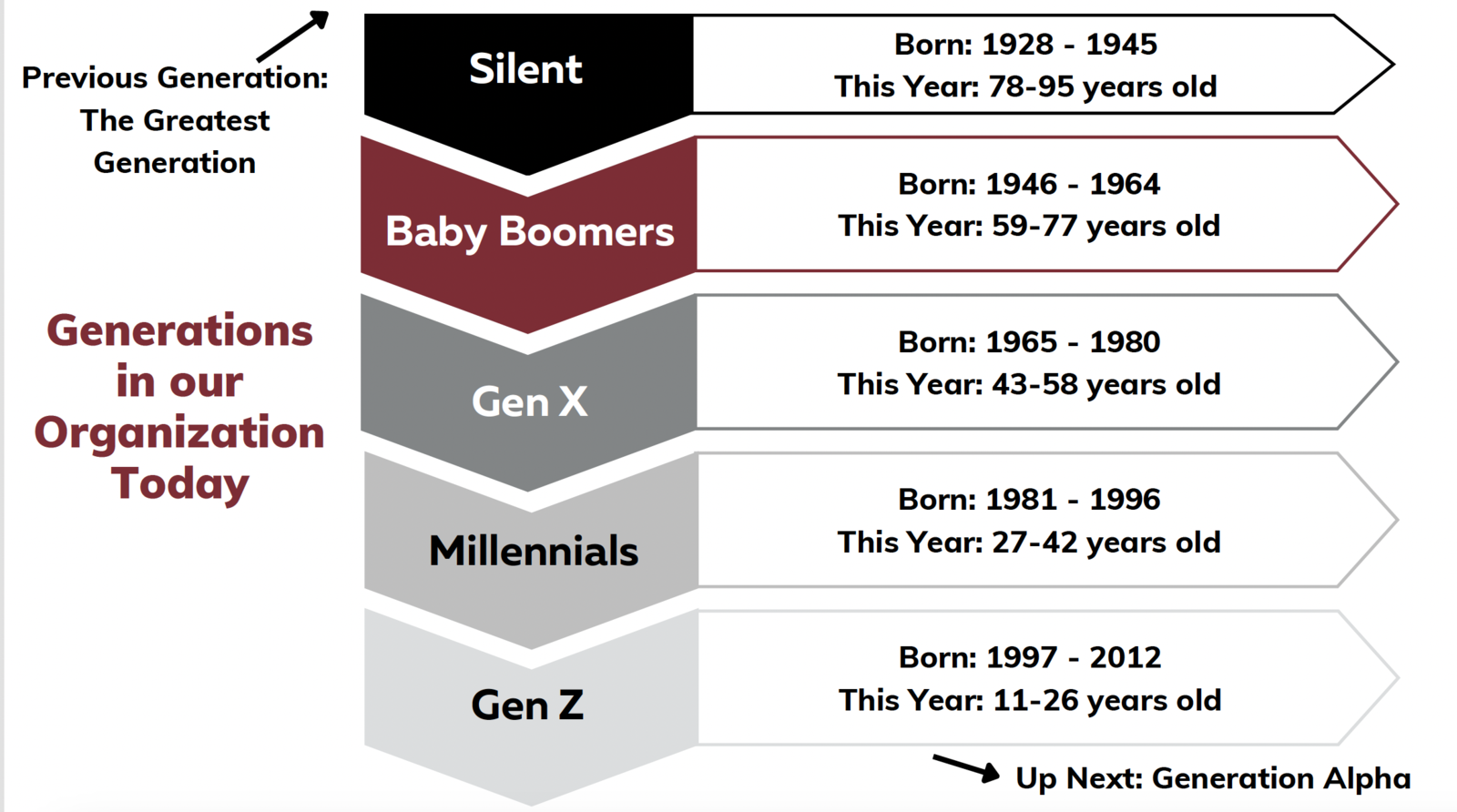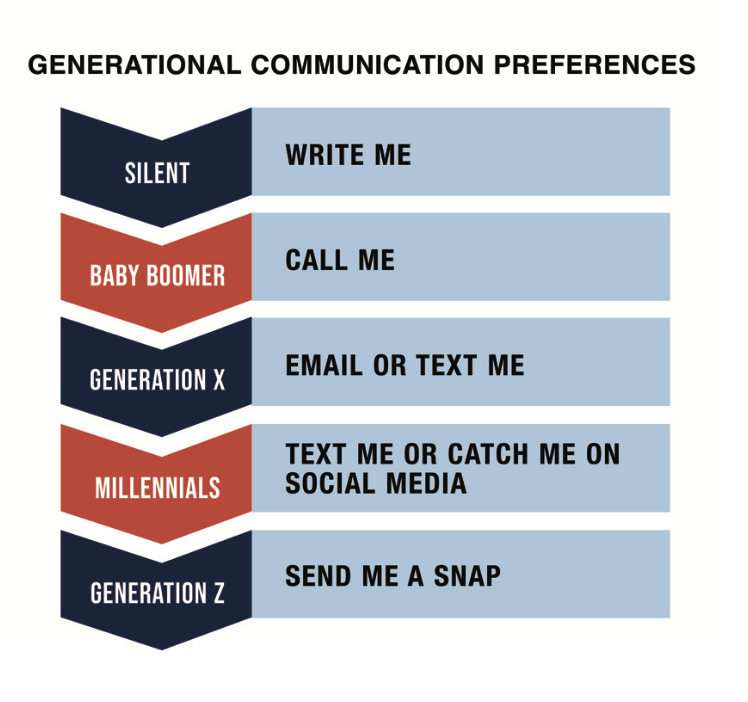test-blog
Leading across generations
Posted on May 9, 2023 12:00 AM
By Jennifer Whittaker, Georgia Farm Bureau
Generational differences are nothing new. What’s different is more generations are interacting at work and in volunteer organizations as people live longer and delay retirement for financial reasons.
Anna Leigh Peek, Nutrien Ag Solutions Sr. Advisor for Learning & Development, led a workshop at the Georgia Farm Bureau (GFB) Presidents’ Conference looking at the five generations county Farm Bureau leaders are encountering in their communities.
Whether supervising multiple generations of employees on your farm or leading them as president of a county Farm Bureau, helping each generation understand each other is key to having a stronger team, Peek said.
“Your county boards can be a mix of folks of different ages,” Peek said. “For us to continue to have success and work together, we need to understand what each generation brings to the table.”
Peek encouraged county Farm Bureau leaders to engage multiple generations as volunteers because of the benefits having a multigenerational team provides, such as 1) multiple perspectives; 2) diverse problem-solving abilities; 3) learning & mentoring opportunities; 4) institutional knowledge transfer/retention & 5) unique relationships.
“Georgia Farm Bureau’s motto is ‘We are all Farm Bureau.’ Even though we may all have a passion for agriculture, how we view the world, work and Farm Bureau can vary,” Peek said. “For us to continue to have success and work together, we need to understand what each generation brings to the table.”

Source: Anna Leigh Peek
Meet the 5 generations
Each generation is shaped by the major world events it experiences in its formative years.
The Silent Generation witnessed the introduction of planes, cars, indoor plumbing and agriculture’s mechanization. Many lived during the Great Depression, and all lived through World War II.
Older Baby Boomers started life in the growing post-war economy the U.S. experienced after WWII. The Cold War, the space race, seeing fathers serve in the Korean War and later serving in Vietnam themselves shaped their perspective along with the Civil Rights and feminist movements.
Gen Xers saw their parents cope with the 1970s gas crisis coupled with high inflation followed by the Farm Crisis of the 1980s. Many celebrated America’s bicentennial. They saw the Cold War end with the fall of the Berlin Wall. This generation was the last to grow up without technology tied to every aspect of their lives.
Millennials are more comfortable with technology as they grew up with personal computers and saw email and the Internet introduced in their childhoods. Many grew up as reality shows took over TV networks and social media became a way of life. They witnessed the first mass school shooting at Columbine, 9/11, and came of age during the Great Recession.
Gen Zers grew up in an influencer culture. They grew up with smartphones and laptops. Mass shootings and whistle blowers sharing state secrets have been regular occurrences their entire lives. Politics have become more polarized. The younger members of this generation are still being shaped.
Don’t make assumptions
Remember there are exceptions to generalizations about each generation and get to know people individually before assigning assumptions to anyone, Peek said. How someone is raised and the values their parents teach can make members of one generation identify with members of another who share the same values.
“Try to get to know the individual. Just because you’ve seen or previously experienced a particular type of behavior with someone from another generation, try to get to know the new person you are working with before labeling them with all the negative traits of their generation,” Peek said. “It makes me mad when people say, ‘Millennials don’t work hard,’ I grew up on a farm, and I have a good work ethic. Not every Boomer was at Woodstock just like every Millennial isn’t a Kardashian.”
Positive & challenging traits
Peek says each generation of volunteers brings assets to the table that can benefit Farm Bureau.
These assets may include: Silent (dependable/detail oriented); Baby Boomers (politically savvy, challenge status quo); Gen X (direct communicators, determined); Millennials (collaborators, tech savvy); Gen Z (practical, natural entrepreneurs).
Challenging traits each generation may have that cause conflict with other generations include: Silent (don’t like ambiguity or change); Baby Boomers (less collaborative/may expect everyone to be a workaholic); Gen X (skeptical, dislikes rigid requirements); Millennials (need structure, distaste for menial work); Gen Z (risk averse, prefer virtual communication).

Source: Anna Leigh Peek
Values & motivation
Each generation usually has different values that drive its actions and life view.
Values of each generation include: Silent (sacrifice, duty before pleasure); Baby Boomers (equality, personal growth, making a difference); Gen X (independence, informality, practicality); Millennials (sociability, diversity, realism); Gen Z (inclusion, safety, sincerity).
“Millennials value realism and Gen Z sincerity, so, if Farm Bureau as an organization isn’t living up to what we say our values are, they tune out,” Peek said.
Things that motivate each generation are: Silent (being respected, recognition); Baby Boomers (being needed/valued, money, teamwork); Gen X (freedom from rules, money/recognition); Millennials (time off, working with others); Gen Z (getting to display creativity, unique experiences).
Aspirations & view of work
Each generation wants different things from their jobs or volunteer involvement. Peek said home ownership was the ultimate achievement for the Silent Generation. Baby Boomers valued job security, so many were workaholics. Gen X saw their parents work a lot, so most prioritize better work-life balance. Millennials seek freedom and flexibility in their jobs, Peek said. Gen Z values job stability and security.
Each generation typically has different views of work, Peek said. Work is an obligation for the Silent Generation, and they respect authority. Baby Boomers have company loyalty and are team players. Gen X are usually more loyal to a profession than one company. Millennials, Peek said, typically want to work with, not for bosses and seek fulfillment from work. Gen Z wants meaningful work and flexible jobs.
Lead by example
Peek encouraged county leaders to be aware of their own tendencies and those of their volunteers. Accept that different generations may not always relate.
“Work to improve your emotional intelligence. Try to perceive what is causing conflict and relate to others constructively,” Peek said. “This may mean not saying things you would like to say.”